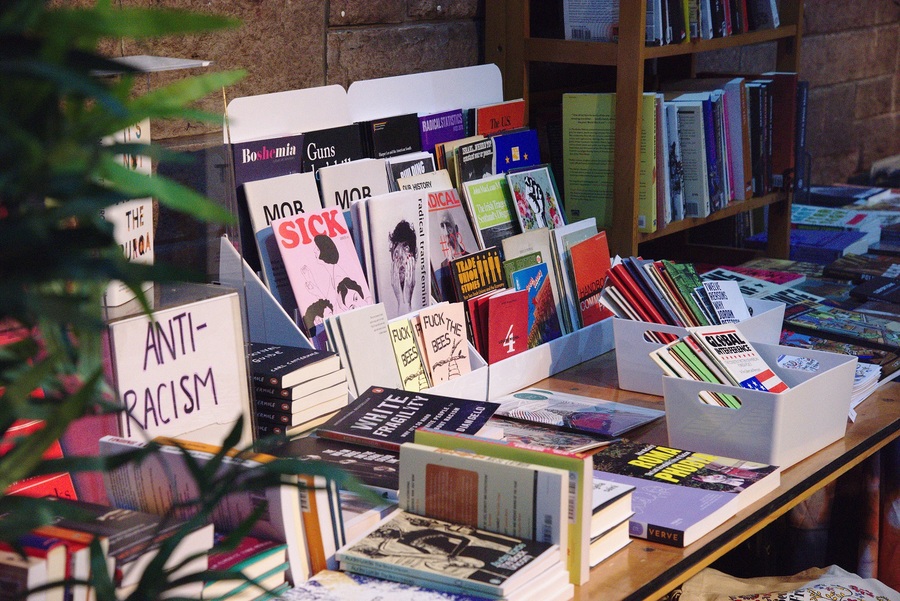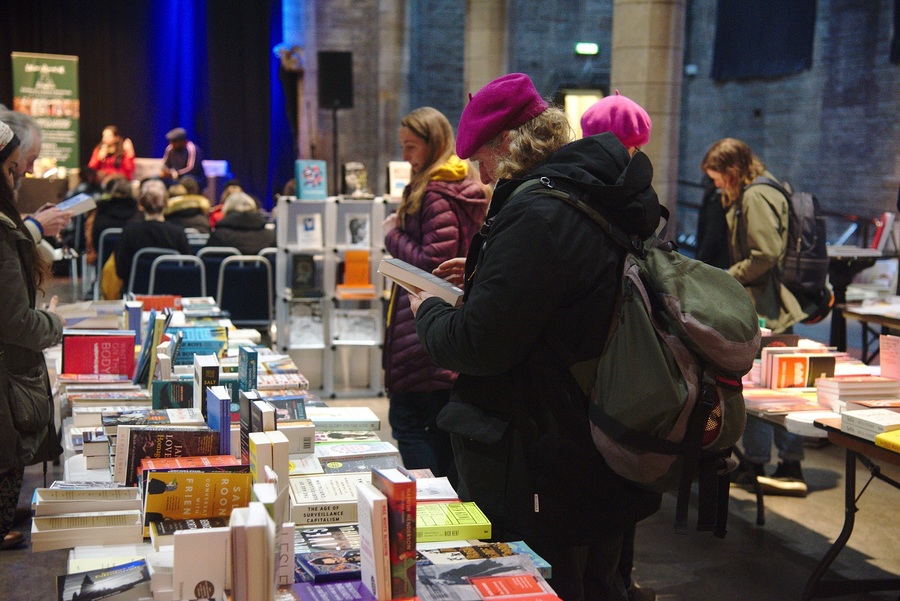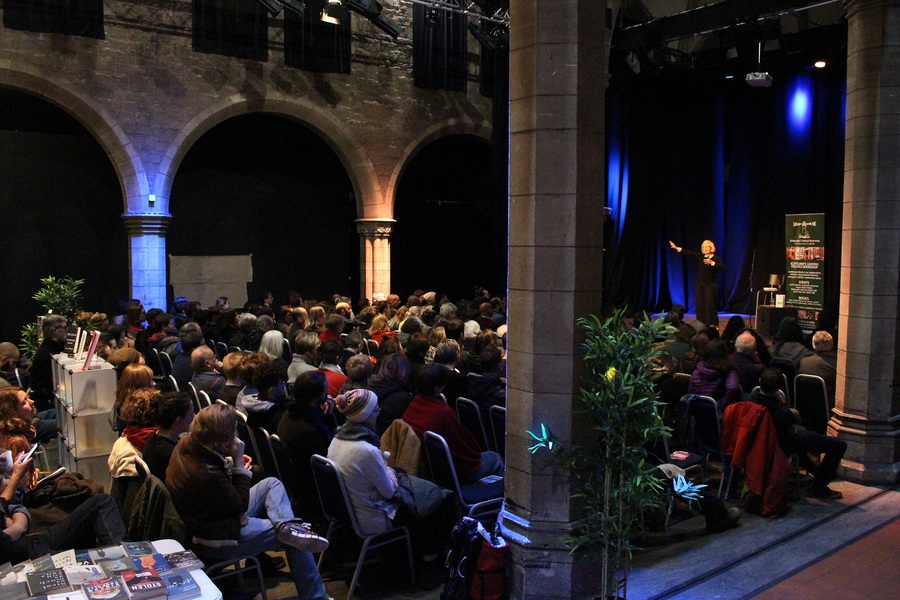Building a better future at Edinburgh's Radical Book Fair
This year’s Radical Book Fair was about looking to the future with radical hope. We went along and learned about the criminal (in)justice system, anticolonial resistance and Britain’s “hostile environment” amongst many other things.
In the midst of an increasingly dystopian election cycle – itself a mere microcosm of the hostile and destructive political environment that has defined the past several years – just stepping into Edinburgh’s Radical Book Fair felt like relief. Now in its 24th year, the fair has been run by the city’s radical bookshop Lighthouse Books since 2017, channelling its ethos of inclusion, collective action and social consciousness in a concentrated four days of talks, community activities and progressive bookselling.
While last year’s fair was dedicated to reclaiming radical histories, this year’s focus shifted forward, considering the ways in which radical hope can help to build a kinder, better, and fairer future. Rejecting naïve complacency wholesale, the programme instead looked at how hope is an active and insurgent force that is necessary in order to challenge and dismantle systems of oppression, reconfigure our relationship with the world and each other, and imagine a new social structure predicated on real, tangible change. Talks such as ‘The Case for the Green New Deal’ with economist Ann Pettifor revealed both the utopias and practicalities of such change, while events such as the lunchtime ‘Be My Guest: On Home and Hospitality’ with author Priya Basil thought through issues of community, identity and connection with a free communal lunch.
Alongside the free tea and rest station, a crafting booth by anti-street harassment collective Hollaback Edinburgh, and the team’s attention to accessibility and the amplification of marginalised voices on stage, in the audience and within the bookstalls, the Radical Book Fair demonstrated how to walk the walk as well as talk the talk, fostering an atmosphere that was dynamic, compassionate and exciting in its possibilities. With so many outstanding talks, selecting highlights is near impossible, but here are a few we can’t stop thinking about.
(In)justice and the State
Possibly the most exhilarating event of the whole festival, the ‘(In)justice and the State’ panel on Saturday afternoon revolved around a deceptively simple but incredibly powerful question: what if societies abolished prisons? As with the rest of the festival, this question was not mere hypothesis or provocation, but rather a passionate, eloquent and hard-hitting investigation of the failed role of prisons in society by a panel of experts: Aviah Sarah Day, an academic in criminology and activist at Sisters Uncut – an organisation fighting cuts to domestic violence services; Carl Cattermole, author of Prison: A Survival Guide; and Kirstin Anderson, a lecturer in Criminal Justice.
The main drive behind their discussion was to dismantle the myths of how prisons or the threat of imprisonment function: Day pointed out that in domestic violence incidents, often female victims are arrested and become criminalised, while Cattermole shifted the perception of prison life away from the violent drama of cinema and to its hellish bureaucratic reality. Day, Cattermole and Anderson entirely rejected ideas of carceral feminism, rehabilitation and justice, positioning prisons instead as an exercise of power by the state intended to control and harm its citizens. In doing so, the panel conceptualised a society that prioritises community and care by abandoning austerity and focusing on society’s vulnerable margins, resulting in a talk that was by turns shocking, funny and profoundly moving.
Priyamvada Gopal: Anticolonial Resistance and British Dissent
Priyamvada Gopal, a specialist in colonial and postcolonial literature, is well known for speaking out against systems that seek to silence her, whether that be at her home institute, the University of Cambridge, or on that pinnacle of contemporary political discourse, Twitter. It was deeply refreshing, then, to hear her thoughts in such a welcoming and dedicated space. In conversation with Nat Raha, a radical poet and activist based in Edinburgh, about her latest book Insurgent Empire: Anticolonial Resistance and British Dissent, Gopal told the packed-out room how she had wanted to write a history of colonialism that countered conservative narratives by scholars such as Niall Ferguson.
Rather than framing freedom from colonial oppression as something that was handed to Britain’s colonies, Gopal instead drew attention to the history of dissent and insurgence within the colonies themselves. The “subjects” of the British Empire, Gopal explained to an eager audience, were in fact agents whose resistance not only gained their own liberty but fundamentally shaped Western ideas of freedom.
One of the most striking aspects of Gopal’s talk was in the questions, where she showed how this empowerment and its subsequent quashing in historical narratives still continues today. Her book was largely ignored by critics and the academy, a fact she connects to universities’ ongoing relationship with colonialism. Given this, the Radical Book Fair’s participation in anticolonial work seems all the more important.
Scapegoat: On the Hostile Environment
A perfect complement to Priyamvada’s event the day before, Maya Goodfellow’s talk on her new book Hostile Environment: How Immigrants Became Scapegoats examined how racist discourse and the aftereffects of Empire are used to silence and dehumanise immigrants today.
In the wake of the refugee crisis and the debate surrounding Brexit and freedom of movement, both Goodfellow’s talk and book are incredibly timely. Demonstrating the violent nature of Britain’s immigration policies even before the so-called hostile environment was officially introduced, Goodfellow discussed the ways in which immigrants are economically, culturally and racially vilified, and how the tangibly destructive effects of this can be seen in incidents of police brutality, such as the murder of Jamaican-born Joy Gardner in 1993, or cases of state neglect, such as Grenfell.
Upsetting and infuriating as her subject was, Goodfellow’s talk still offered a kind of hope. By outlining the cruelty of the hostile environment, Goodfellow opened up a space to consider a world where borders, and not the people who cross them, are seen as the problem. And as with everyone else at the Radical Book Fair, she made a convincing case.


